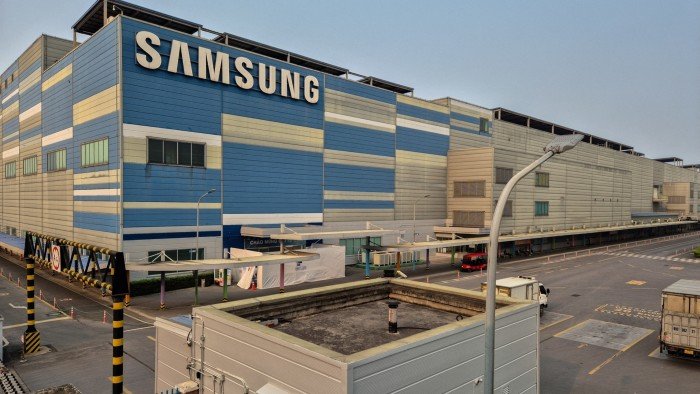Samsung boosts profits as customers stockpile chips ahead of tariffs

Unlock the White House Watch newsletter for free
Your guide to what the 2024 US election means for Washington and the world
Customers stockpiling chips and bringing forward smartphone purchases ahead of US tariffs and export controls have boosted Samsung Electronics’ quarterly profits.
Shares in the world’s largest memory chipmaker jumped 2.1 per cent on Tuesday morning as the South Korean company forecast its operating profit for the January to March quarter would be Won6.6tn ($4.5bn) — higher than the Won5.2tn given by LSEG SmartEstimate — with sales projected to rise about 10 per cent year-on-year.
However, its share price rise lagged behind that of local rival SK Hynix, whose stock rose almost 4 per cent as the South Korean market recovered slightly following Asia-wide losses on Monday.
While most semiconductors were exempted from US tariffs declared last week, US President Donald Trump said the day after his announcement that tariffs on chip imports would begin “very soon”.
The expectation of US tariffs in recent month has driven demand for tech products that require both advanced and less sophisticated “legacy” chips, boosting Samsung’s sales.
The US is also expected to continue to tighten export controls and other restrictions on foreign chipmakers selling to China or partnering with Chinese companies, following Chinese artificial intelligence start-up DeepSeek’s high-profile research breakthroughs earlier this year.
That has resulted in a rush by Chinese tech groups to stockpile memory chips and AI chips, including Samsung’s high-bandwidth memory (HBM) components used in Nvidia’s H20, an AI chip configured to be sold to Chinese companies in compliance with US restrictions.
Samsung’s contract chipmaking division also produces AI chips on behalf of Chinese customers, including search provider Baidu. The Financial Times reported last week that Samsung last year sold several years’ supply of logic dies — a crucial component in manufacturing AI chips — to Baidu’s semiconductor design subsidiary.
Despite the better than expected first-quarter results, analysts said the Korean tech giant’s semiconductor division continued to grapple with falling prices, delayed shipments of AI chips and widening losses in contract manufacturing.
Samsung is redesigning its most advanced HBM products to pass Nvidia’s qualification tests for its flagship AI chips, while losses at Samsung’s foundry business, which makes chips for external customers, are ballooning as it has failed to broaden its customer base and boost yields.
But Jeff Kim, head of research at KB Securities, said Samsung was likely to benefit from the improving chip cycle in the coming quarters. “Their earnings will improve this year after hitting the bottom in the first quarter, with chip demand outpacing supply,” said Kim.
Goldman Sachs analysts expect conventional chip prices to reach a positive inflection point in the third quarter after falling by a smaller margin in the second quarter.
Meanwhile, Samsung’s smartphone division benefited from strong first quarter sales of its flagship Galaxy S25 smartphone, driven in part by presales to North American customers keen to avoid price rises resulting from US tariffs.
Trump last week announced a 25 per cent tariff on imports from South Korea, in a move likely to mean price increases for Samsung’s various consumer electronics products such as smartphones, TVs and other home appliances.
The US president also announced a 46 per cent tariff on imports from Vietnam, where Samsung produces nearly half its smartphones. Samsung also makes most of its televisions sold in North America in Mexico, which faces a 20 per cent US tariff.
Analysts noted the rush from customers to secure chips and smartphones in the first quarter of this year meant there was a high possibility of Samsung’s sales stagnating in the second quarter.
Source link



